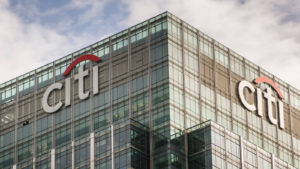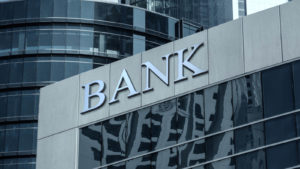With a stressful year behind us, it’s time to buy undervalued stocks, including the seven bargain financial stocks we’ll discuss today. Historically, this industry is known for sizable dividends and strong profitability, especially now with rising interest rates. When combined with attractive entry points, these seven bargain financial stocks could help return solid gains. Even better, these financial stocks are all selling at a discount to their book values while offering strong prospects.
| C | Citigroup | $49.09 |
| NYCB | New York Community Bancorp | $9.45 |
| BBVA | Banco Bilbao Vizcaya Argentaria | $6.85 |
| STC | Stewart Information Services | $47.03 |
| CIB | Bancolombia | $29.39 |
| KB | KB Financial | $45.56 |
| CUBI | Customers Bancorp | $29.50 |
Citigroup (C)

Citigroup (NYSE:C) is one of the nation’s largest banks. It has a dominant franchise spanning investment banking, retail operations, and a massive international footprint. Unfortunately, the company also developed a strong reputation for problematic situations. For example, Citigroup once sent $900 million to Revlon creditors in an epic blunder. Meanwhile, the bank should have only sent $7.8 million.
However, despite its fair share of gaffes, the stock has become undervalued. So much so, it now trades at about half of its book value, which is well under other U.S. banks. In addition, the stock trades at just 6.7x earnings and pays a dividend yield of 4.2%. Sure, Citigroup is far from the most efficient or well-run bank in the country. But its operations are strongly profitable and maintain considerable investment appeal. For value investors, Citigroup is a worthy buy at today’s prices.
New York Community Bancorp (NYCB)

New York Community Bancorp (NYSE:NYCB) is a large regional bank in New York City. The bank has historically run a unique model focused on lending primarily to multi-family housing landlords. There are relatively few banks that lend against this property type in New York, giving the bank a solid niche with a broad pool of clients. These loans are exceptionally low risk, given the stability and demand for New York apartments.
On the other hand, New York Community Bancorp has delivered meager returns in recent years as the low-risk business simply hasn’t generated enough profits to excite shareholders. However, things appear to be changing. The bank finalized its merger with Flagstar Bancorp, which now expands the firm’s lending operations and brings in a larger amount of low-cost deposits. This should immediately boost the combined bank’s earnings considerably. Throw in a discount to book value and a mouth-watering 7.2% dividend yield, and NYCB stock is set to rise in 2023. Due to the low-risk nature of its loan book, the bank is also better positioned than most if and when a recession does in fact hit.
Banco Bilbao Vizcaya Argentaria (BBVA)

Banco Bilbao Vizcaya Argentaria (NYSE:BBVA), or BBVA for short, is a multinational bank headquartered in Spain. Despite its European roots, BBVA has evolved primarily into an emerging market bank. It generates three-quarters of its profits away from Spain, and close to half from its Mexican operations alone.
This has been a favorable development for BBVA as Latin American economies have been more dynamic than European ones recently. European banking shares have had a miserable decade amid low-interest rates, sluggish consumer spending, and minimal GDP growth.
Investors may overlook BBVA stock due to being based out of Spain. However, its key franchise in Mexico has much more promising prospects. The Mexican economy has performed well coming out of the pandemic, with it particularly gaining strength in the manufacturing sector. As companies rethink their supply chains, many firms are reducing production in China and increasing activity in Mexico instead, which leads to more lending prospects for BBVA.
BBVA stock has rallied sharply over the past few months. Despite that, shares remain cheap. Not only are they at a discount to book value, but they also sell for less than seven times earnings. As if that weren’t enough, BBVA stock also offers a 6.7% dividend yield.
Stewart Information Services (STC)

Stewart Information Services (NYSE:STC) is involved with the attractive title insurance industry. This form of insurance protects banks and homeowners from any defects in the deed for properties. Unlike most forms of insurance, damages tend to be quite limited compared to premiums, leading to large profits for the insurers. So, why do people buy title insurance? Most banks won’t issue a mortgage for a home unless the buyer purchases title insurance.
Thus, Stewart and its peers have a tremendous business, as they get a nice cut of just about every home purchase in America. Right now, the market isn’t so impressed, however. With home prices topping out and new home purchases losing steam, analysts are preparing for a downturn in demand for title insurance along with other housing-related products. That’s a valid concern. But it’s a short-term issue. The long-term appeal of title insurance remains bright. Meanwhile, STC stock now sells for less than seven times forward earnings and pays a 3.8% dividend yield as well.
Bancolombia (CIB)

Bancolombia (NYSE:CIB) is Colombia’s largest banking firm. It, along with its two chief rivals, controls about 70% of the nation’s banking market. This leads to high-profit margins thanks to limited competition. Bancolombia also controls a sizable banking franchise across Central America.
Shares took a hit in the back half of 2022 following Colombia’s election of Gustavo Petro. In theory, this could be a major negative for the bank. However, South American countries have a tendency to swing dramatically between the left and right without causing too much change to underlying business fundamentals.
Colombia historically has been pro-business and offered shareholders strong returns. Bancolombia, for its part, has been listed in New York since 1995 and has delivered a total return (including dividends) of more than 600% since its listing in that year. The current sell-off could be a golden opportunity. Shares now go for just four times forward earnings and are at a significant discount to their traditional price/book value ratio. Meanwhile, Colombia’s economy has been heating up over the past year, as it is a major exporter of crude oil and other commodity products which benefit from inflationary conditions.
KB Financial Group (KB)

KB Financial Group (NYSE:KB) is South Korea’s leading financial group. It’s more than just a bank. It has invested heavily in other lines of business such as securities and insurance to smooth out operations and reduce its reliance on core banking profits. In addition to its leading position in the South Korean market, KB also operates in numerous other Southeast Asian markets and has recently furthered its footprint with acquisitions in Cambodia and Indonesia.
What’s the appeal of a South Korean banking franchise? South Korean equities have been depressed for the past few years. That’s driven by a series of concerns around the Chinese economy, regional geopolitical tensions, and worries around the demand for key South Korean exports. However, arguably, this is all reflected too heavily in the prices of leading South Korean companies, including KB stock. Shares are now going for less than 5.5 times forward earnings. The stock pays a greater than 6% dividend yield. In addition, the company just announced a new share buyback program as well.
Customers Bancorp (CUBI)

Customers Bancorp (NYSE:CUBI) is a smaller regional bank based out of Pennsylvania, which has enjoyed tremendous growth over the past few years. The bank’s revenues surged from $288 million in 2019 to $405 million in 2020 and then $735 million in 2021.
Customers Bancorp achieved this through an aggressive digital strategy. Customers have launched a banking-as-a-service platform for FinTech and cryptocurrency companies. This is to say that Customers has served as an FDIC-regulated conduit to help provide liquidity to emerging sectors of the economy. Doing business for crypto and FinTech companies has given Customers Bancorp access to a large pool of low-cost deposits which, in turn, can be lent at highly profitable rates.
Now, however, any and all banks with a cryptocurrency angle have come under fire. However, this may be overblown. For banks that merely hold cryptocurrency deposits, rather than lending to crypto firms, there should be minimal risk. Regardless, CUBI stock has dropped nearly 60% over the past year, which now puts shares at just four times forward earnings.
On the date of publication, Ian Bezek held a long position in CIB and NYCB stock. The opinions expressed in this article are those of the writer, subject to the InvestorPlace.com Publishing Guidelines.
